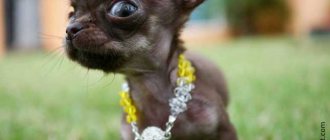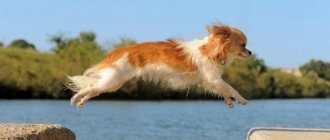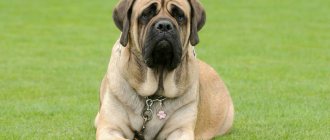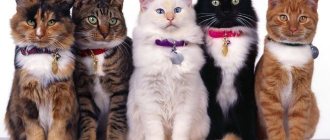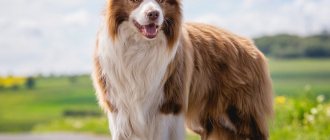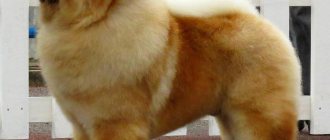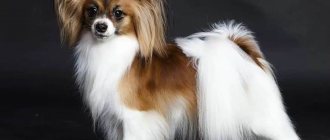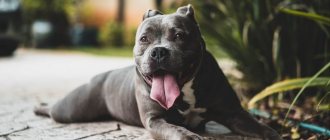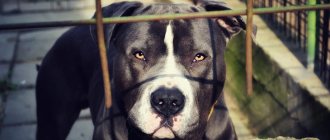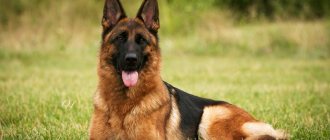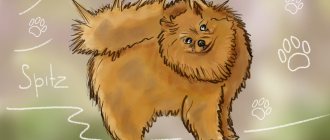Poodle
Fun fact: the poodle is the national dog of France. Known for their intelligence, they easily learn circus acts to perform in front of huge audiences. Poodles often take first place in the international documentary project "Winners of Show" and in prestigious competitions such as the Westminster Kennel Club Dog Show (an all-breed show that has been held in New York annually since 1877).
The smartest breeds of small dogs
The top ten included the most talented dogs, including 3 small breeds. They learn new tasks and remember them for a long time after 1–5 repetitions. 95% react instantly, even if they hear the command from a distance. A novice trainer can handle dogs in this group.
Miniature and Toy Poodle
The breed ranks 2nd in the overall scale and is second only to the Border Collie. It includes 4 groups of dogs that vary in size. Small subspecies appeared as a result of selective selection of small individuals and are not inferior to large brothers in intelligence. The height at the withers of miniature poodles is 28 – 33 cm, toy 24 – 28 cm.
Poodles are called true intellectuals, regardless of size.
Dogs easily understand facial expressions, gestures, remember individual words, and subtly sense voice intonations. They love attention, try to please the owner, are not inclined to be stubborn and would rather give in than enter into conflict.
Miniature and toy poodles perform in the circus no worse than royal ones.
Toy poodles behave more reservedly, while toy poodles are more playful and active. But both subspecies are easy to learn and remember commands for a long time. They are endowed with musical abilities, artistry, and quick reactions, so they often take prizes in freestyle and work in the circus. Poodles do not shed and rarely cause negative reactions in allergy sufferers.
Sheltie
The breed was developed by the first settlers on the Shetland Islands near Scotland, crossing collies and native Spitz-type dogs. Sheltie's ancestors deftly herded sheep, guarded the farm, and later became companions.
The average height of the Shetland Sheepdog is 36 cm.
Shelties are extremely active, intelligent and responsive. They have inherited the habit of working in conjunction with a person, like all herding dogs, so they learn quickly. The Shetland Sheepdog cannot be called a dog with high self-esteem. During training, they try to please their owner and not make mistakes. Due to their natural softness and vulnerability, they react poorly to harsh criticism and pressure.
Shelties are leaders in world agility among dogs of their weight category.
Papillon
Miniature elegant dogs 20 – 27 cm tall, weighing 2 – 4 kg. They first appeared in France, where they became favorites at the royal court. A distinctive external feature of the Papillon is large, straight, slightly set ears with long feathers. In shape they resemble the wings of a butterfly, hence the name papillon, translated from French as butterfly.
Stanley Coren placed the Papillon in 8th place.
Papillons combine the qualities needed for basic and sports training: lively temperament, curiosity, sharp intelligence, endurance. Restless dogs do not like to sit idle and learn new skills with interest. They are sensitive to the owner, sensitive to praise. They support any initiative - games, training, walks and travel.
Gambling Papillons often win agility competitions.
Scottish Terrier
Scottish Terriers were originally bred as working dogs in Aberdeen, Scotland. Used to chase foxes, rabbits, badgers and other small animals. They are very friendly, but can be dominant over other dogs.
Tell your amazing story
GET 500 rubles
French lap dog
Another lap dog, but this time French, was also included in the presented rating. It should be noted that her mental abilities are very controversial and depend largely on the owner, his patience and teaching abilities. But, if you manage to find the key to effective training, then you will get not only a devoted and faithful friend, but also a very smart dog who clearly assesses the surrounding reality.
Yorkshire Terrier
As the name states, Yorkshire Terriers originated in Yorkshire, England. Their small size made them ideal for hunting and catching rats that set off mines during the war. There are five breeds that make up the general concept of “Yorkshire Terrier” - Biewer York, Biro Yorkie, Mini Yorkie, Baby Face and Standard Terrier. Today they are very popular among celebrities. Easily fits into small bags and is ideal for shopping. Classified as “highly intelligent” dogs, they are easy to train at a young age.
Dwarf dachshund
The breed was finally formed in Germany at the end of the 19th century, thanks to the crossing of a standard dachshund and a miniature pinscher. The height of an adult is no more than 21 cm, and its weight is 4.5 kg.
dachshunds are born burrow hunters ; while walking, they constantly try to dig the ground in search of prey, and at home they hunt for smaller pets. She is active and willful, loves to spend time with children, but will not tolerate disparaging treatment and aggression . With a loud bark, the dachshund warns the owner about the guests and drives the stranger away from his territory. Possessing leadership qualities, it requires a strict and responsible owner .
Shih Tzu
Shih Tzus are incredibly beautiful dogs. The name is translated as “little lion”. The breed originated in China, Tibet more than 1000 years ago. They are independent by nature, extremely affectionate, and intelligent. They are easy to train as long as they are rewarded with treats and praise. The Shih Tzu is a breed that requires professional grooming at least every 5 weeks. An interesting fact is that these dogs were almost lost during the communist revolution and the breed had to be revived.
Maltese
It is impossible to ignore the Maltese dog. A small, almost plush animal that evokes nothing but affection, is distinguished by excellent intelligence. They take part in games with great pleasure. At the same time, the Maltese adapts its energy, which is, in fact, exorbitant, to the potential of its owner. It is for this reason that these pets are recommended for citizens with disabilities, as well as elderly people. And indeed, the life of the owners changes dramatically, meaning and purpose appear in it. At the same time, all efforts by the dog itself are regulated within the framework of what is permitted for a person. Let's look at an example: if it is not possible to walk regularly, then the dog can easily do without it. Need to spend some time with another person? No problem. At the same time, devotion and attachment to the owner is not even discussed.
Pomeranian Spitz
Pomeranians are gorgeous little dogs that dote on their owners. Sometimes they adore them too much and can be overly obsessive. They like to live in an apartment and can bark a lot. The dogs are very smart and easy to train. A Pomeranian will always follow you wherever you go and will want to sleep next to you at night. This breed can be a wonderful companion for you.
Griffon
For lovers of a quiet life, griffons are the best choice. This dog, unique in its appearance, has an extremely calm and balanced character. She doesn't make noise and doesn't play around all the time, although she really loves to run. At the same time, the animal’s intelligence is visible in its eyes. The dog is easy to train, and remembers learned commands forever and, most importantly, carries them out flawlessly. In Russia, unfortunately, the breed has not yet gained serious popularity. But, according to experts, this is a temporary phenomenon associated with the need to create truly comfortable living conditions.
Jack Russell Terrier
Jack Russells are charming dogs that get used to their owners at a very young age. They love to jump, jump and explore any objects. Jack Russells are very curious dogs. This breed needs to be trained, its representatives must communicate with other dogs from an early age. Incredibly smart, but can be stubborn. Jack Russells need discipline and training.
Dog intelligence
Canadian neuropsychologist and passionate dog fan Stanley Coren spent his entire life studying the behavior and relationships with humans of representatives of different breeds. The professor identified 3 components of dog intelligence:
- Instincts are innate, genetically determined skills and abilities.
- Adaptation is the ability to solve problems in non-standard situations of everyday life.
- Obedience is the ability to understand a person, remember and follow commands, and enjoy learning.
In 1994, Koren compiled a scale of the intellectual level of more than a hundred breeds, combining animals into 6 groups. The first included dogs with exceptional abilities, the last - with very low learning ability. The professor took as a basis the third component of intelligence - obedience. Instincts and adaptive talents were not taken into account.
During the research, he surveyed judges of kennel clubs in Canada and the USA and received 199 detailed responses. Dog handlers assessed the breeds according to two criteria: the ability to remember new commands and the ability to immediately carry out already mastered ones.
Chihuahua
These small dogs are native to Mexico. An intelligent breed, capable of learning everything at an incredible speed. They are good at agility and obedience exercises and are curious and daring explorers. Chihuahuas sometimes like to make noise. Although they are quite small in size, they have a really bold character. They live well in families and love children.
Japanese Chin
A royal breed with an interesting appearance and small size, they are no taller than 25 cm, weighing from 1.8 to 3.2 kg. The Japanese Chin was brought to Japan in the 3rd century AD and immediately gained popularity among the nobility and emperors, but ordinary people were forbidden to have these pets, and its theft was considered a serious crime .
Today, anyone can become the owner of a cheerful and good-natured Chin. They love to be the center of attention and participate in all family activities, but long walks tire them . The Japanese Chin usually leads a measured lifestyle and adapts to the life of its owner, but in moments of anger it shows willfulness, courage and recklessness.
1. Cavalier King Charles Spaniel
These graceful dogs come from England. The King Charles is one of the most popular dogs in the USA. They have average intelligence, but are valued higher in intelligence than many other breeds. Bark little and need treats when it comes to training.
As we see, the smartest dogs of small breeds can do a lot of things - carry mail, show circus acts, be your warmer, play sports with you, scout the situation, guard. We are confident that you have found the right pet for your personality and pace of life. Small dogs are unique. They can live in an apartment and visit various public places with you.
Small smart dogs with above average abilities
Dogs in this group master new skills after 15–25 repetitions and in 70% of cases complete the task on the first command. It included 29 breeds, including 7 miniature ones from the family of small terriers and pinschers. Dogs can be safely called solid “good students”, but they need regular classes and constant consolidation of skills. For comparison, animals with low learning ability require more than 100 repetitions to master a command.
Yorkshire Terrier
Yorkies open the list of breeds with above average intelligence. In Koren's overall ranking, they share 27th place with large dogs - Puli and Chesapeake Bay Retrievers.
Show Yorkies are not cut.
Yorkies look adorable, so they are often pampered, jokingly called “handbag guards.” But they retained the qualities of terriers - curiosity, excitement, tirelessness, courage. Emotional Yorkies engage in common activities with their owner with interest and quickly get involved in games and training. They constantly keep the owner in sight, carefully monitoring the reaction.
Yorkies are quite trainable, intelligent dogs if you train them.
Australian Terrier
Strong, unpretentious dogs with coarse hair up to 28 cm tall. The breed was bred by the first European settlers in Australia to fight rats, snakes and protect. The selection involved small terriers from Great Britain with developed working skills as burrow hunters and watchmen.
In their homeland, Australian terriers have become a national treasure. Farmers even now willingly take on hardy, smart dogs as assistants. Domestic Australians are lively, easy-to-train companions. They are people-oriented, love praise, attention, and active games, which makes training easier. Constant training helps to correct the behavior of active animals. During classes they splash out their energy and satisfy their natural curiosity.
Cairn Terrier
The Cairns are considered the great-grandfathers of all small terriers in Scotland. The breed was bred in the 16th century to hunt burrowing game in rocky terrain. Now Cairn Terriers have turned into indoor companion dogs, but have not lost their hunting skills.
The height of the Kerns does not exceed 31 cm, but in character they are typical terriers - active, brave, curious and playful, with a bit of stubbornness. The owners say: nothing is impossible for cores. They are easy to train. Sometimes they show an independent character, but quickly switch if interested.
The Cairn Terrier will always support an offer to play.
The Kerns achieve success in sports, receive prizes at international competitions, and star in films. A dog named Terry participated in the filming of 16 films over 9 years. The most famous role is Toto from The Wizard of Oz.
Affenpinscher
The breed first appeared in the 17th century in Germany. Outwardly, affens resemble disheveled little monkeys, which is reflected in the name. Affenpinscher translated from German means “monkey pinscher.” Dogs grow up to 28 cm and weigh up to 6 kg. The hard, protruding fur hardly sheds and does not smell.
Affenpinschers are hyperactive, inquisitive explorers. To avoid destructive behavior, they are loaded with intellectual and physical work. According to owners' reviews, Affenpinschers love to learn, quickly pick up commands, and master complex tricks. But for successful classes you need strong motivation and frequent changes of tasks. The Affenpinscher gets bored with repeated repetitions and loses interest.
If you haven’t come up with a name for your puppy, you may find the Generator of beautiful and short nicknames useful.
miniature pinscher
The smallest representative of the pinscher family from Germany. Outwardly, these are small dogs with smooth hair, black and tan or brown, 25–30 cm tall. Miniature pinschers move with a remarkable prancing gait, raising their front legs high.
Miniature pinschers are not aware of their size and behave self-confidently and courageously. They boldly rush to protect their owner if he is in danger. They guard the house vigilantly, warning of the approach of strangers.
Owners note that their pets have good memory and reaction, ingenuity and irrepressible energy. Miniature pinschers are easy and fun to train, but training inhibits their innate desire to lead. Observant dogs quickly notice people's weaknesses and begin to manipulate, so they need a “steady hand.” Miniature pinschers love the attention of their family and are happy to show tricks with the family. Agility is easy for dogs.
The miniature pinscher overcomes obstacles 5 times its height.
Silkie Terrier
Miniature dogs from Australia, up to 27 cm tall, which combine decorative appearance and the character of a terrier. The breed arose by crossing rough-haired Australian and Yorkshire terriers. Initially, snares protected farms from the invasion of rodents and snakes. Now they have become household companions, but have not lost their hunting skills and will be able to catch rats and mice in the house.
The main decoration of the snare is its long silky wool.
The hair flows almost to the ground and has a silvery sheen. It does not roll into tangles, almost does not shed and does not smell. Smart, inquisitive dogs quickly learn new things, but excessive impulsiveness sometimes interferes with their studies.
Norwich Terrier
Small dogs with hard, shaggy hair. The average height of Norwich is 25 cm, weight 5 kg. The breed was developed in Norfolk in eastern England towards the end of the 19th century. The nimble, oversized dogs masterfully caught rats and hunted in holes. Almost immediately they spread among students at Cambridge University. Clever Norwiches have become talismans of good luck, so they received a second name - Cambridge Terriers.
Norwich Terrier puppies grow up playful and perky.
Norwich puppies are easily adaptable and build peaceful relationships with family, including children and animals. Adult dogs need physical and mental exercise. They learn quickly, and they carry out their owner’s orders not for a treat, but because they want to please them.
Norwich Terriers do not bark for no reason. They express their emotions by barking. They don’t bully the dogs they meet on the street, but they do get carried away. In pursuit of a cat or bird, sometimes they forget about the owner and run away.
The level of intelligence does not depend on the size of animals. The Koren scale also includes small, intelligent dog breeds. It’s just that miniature pets are often treated like toys and are not burdened with education and activities. As a result, they don’t always know what they can and can’t do, and they don’t know how to follow simple commands, so they seem dumber than they really are.
Dear readers, write comments. Your additions will make this article much more interesting and useful for all dog lovers.
Bichon Frize
A French lapdog with curly, thick snow-white hair, whose roots go back to the 12th-14th centuries. on the Mediterranean coast, the ancestors of this breed were intended for catching rats on ships . The weight of a small white dog does not exceed 5 kg, and its height is 30 cm. They have a kind and cheerful disposition , they are characterized by courage, but not aggressiveness. Very active, playful and easy to train , they need frequent regular walks and grooming. Bichon Frize can only be white ; beige and peach shades are not acceptable for the breed.
